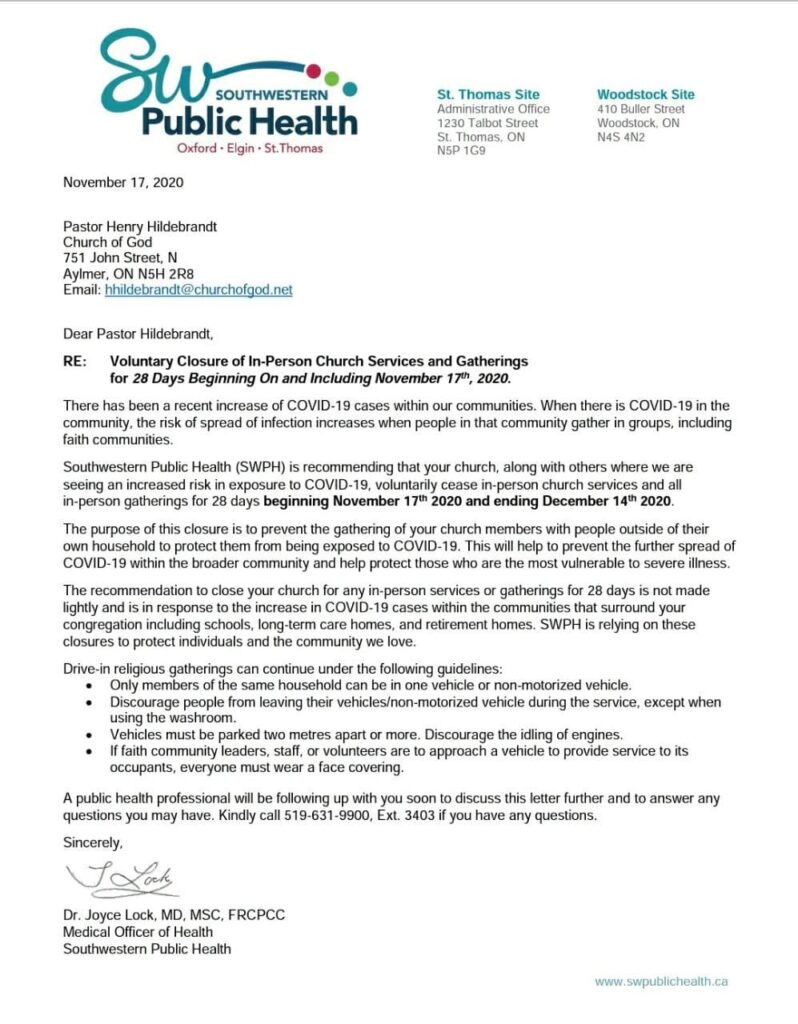An outspoken pastor is calling out a notice from his local public health agency recommending his church shut its doors for 28 days on a “voluntary” basis to reduce the risk of COVID-19 transmission.
“When there is COVID-19 in the community, the risk of spread of infection increases when people in that community gather in groups, including faith communities,” the letter, signed by Southwestern Public Health Medical Officer of Health Dr. Joyce Lock said. “Southwestern Public Health (SWPH) is recommending that your church, along with others where we are seeing an increased risk in exposure to COVID-19, voluntarily cease in-person church services and all in-person gatherings for 28 days, beginning November 17, 2020 and ending December 14, 2020.”
Pastor Henry Hildebrandt of Aylmer, Ont.’s Church of God shared the letter on his Facebook page Thursday afternoon. It was dated Nov. 17, the same day its recommended closure was to go into effect.
“The recommendation to close your church for any in-person services or gatherings for 28 days is not made lightly and is in response to the increase in COVID-19 cases within the communities that surround your congregation including schools, long-term care homes, and retirement homes,” the letter continued. “SWPH is relying on these closures to protect individuals and the community we love.”
A spokesperson for Southwestern Public Health said the agency sent letters to “several churches.”
“These churches are in areas where we are seeing higher rates of community transmission,” the spokesperson said. “Attending church, where there may be singing, talking and long periods of sitting or standing in close proximity are higher risk situations for the spread of COVID-19.”
There is no province-wide order for places of worship to close, nor is the provincial government recommending any voluntary church closures.
“Local medical officers of health make decisions regularly using local data to supplement Ministry [of Health] directives,” the Southwestern Public Health spokesperson said. “For example, we have also asked Long Term Care Homes and Retirement Homes to temporarily suspend day and over night visits. As with the request to the churches, this is intended to mitigate risk and keep community members safe.”

“A public health professional will be following up with you soon to discuss this letter further,” the letter said. Hildebrandt noted he received a follow-up call from the health unit, which he sent to voicemail.
While the letter makes reference to “others,” Hildebrandt said he has not been able to identify any additional churches that have received a similar letter.
“I can’t find others yet. I did research – so far I can only find one pastor that got this letter from Southwestern Public Health,” he said, referring to himself.
A representative of the nearby Aylmer Evangelical Mennonite Mission Church confirmed it received no letter.
Speaking to his congregation Thursday evening, Hildebrandt called the request “crazy.”
“We are guaranteed by the government religious freedom, [freedom of] opinion and expression, peaceful assembly, association. It’s in the Charter of Rights and Freedoms,” he said. “We could never have dreamed that in Canada we would be asked by a government official, ‘Would you voluntarily close your church?’… You must be crazy.”
Lock’s letter noted that drive-in services can continue, though the church must “discourage the idling of engines.”
With the forthcoming arrival of winter, Hildebrandt said he “would encourage the idling of engines, because I don’t want you to freeze in your cars.”
The Church of God was among the first Ontario churches to host drive-in services when houses of worship had been shut down altogether by the province’s initial lockdown measures earlier in the year. After first threatening to fine the church and its congregants, Aylmer police eventually backed off, and the province issued guidelines specifically permitting drive-in church attendance.
As for Hildebrandt’s response to the latest request to close his church’s doors: “God forbid.”

